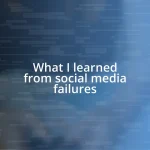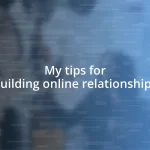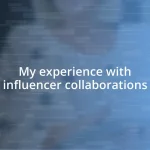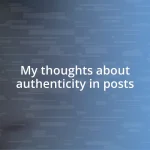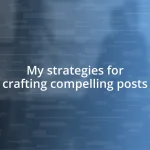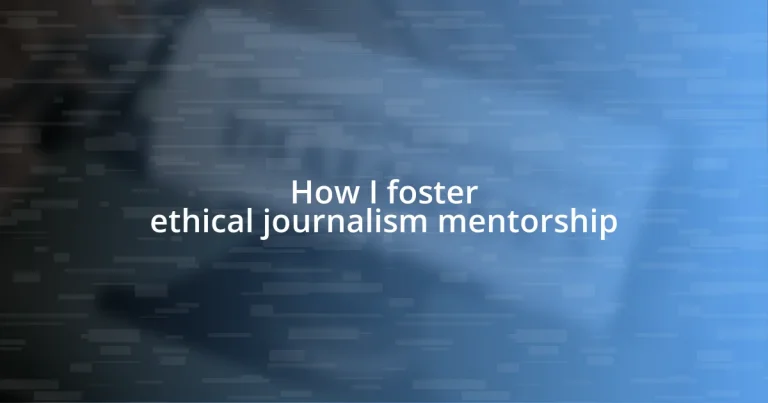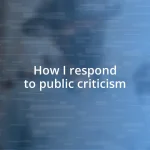Key takeaways:
- Ethical journalism relies on principles such as accuracy, transparency, and minimizing harm, with mentorship fostering understanding of these values.
- Effective mentorship involves creating a structured framework with clear objectives and encouraging open communication and mentee involvement.
- Encouraging critical thinking through discussions and reflection on experiences helps mentees navigate ethical dilemmas and develop resilience in journalism.
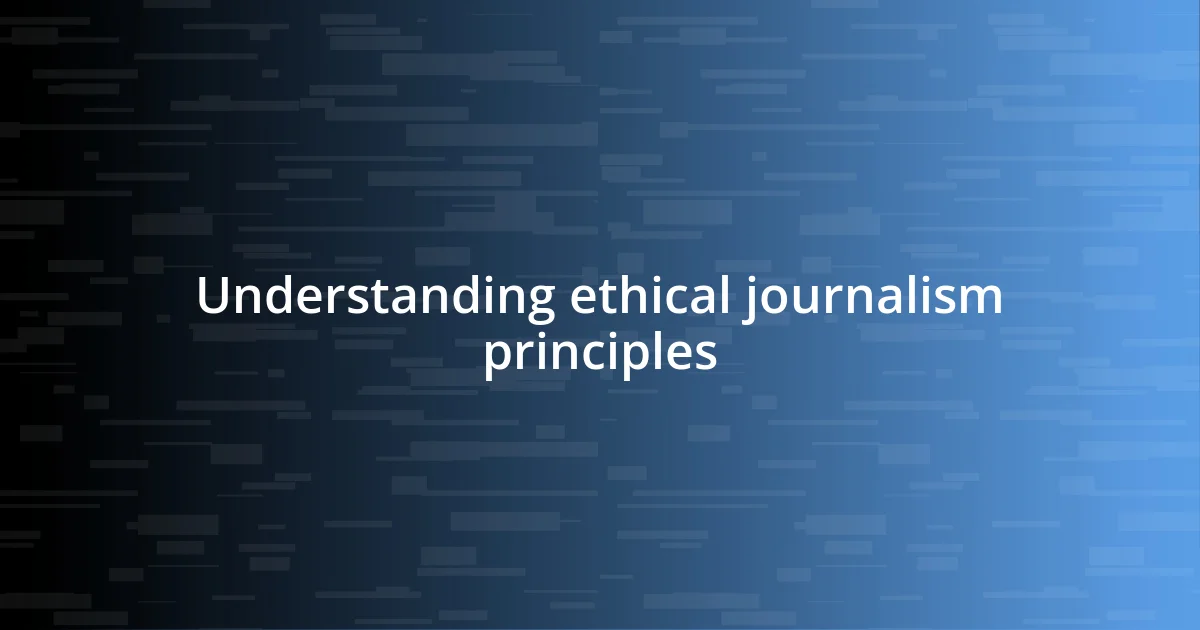
Understanding ethical journalism principles
Ethical journalism is grounded in principles like accuracy, fairness, and accountability. I still remember my first assignment, where I misrepresented a quote. The feeling of not just letting my editor down, but potentially misleading my readers was a wake-up call. How can we expect trust from our audience if we don’t hold ourselves accountable?
Another essential principle is transparency. I once interviewed a source who was hesitant to share their story due to fear of backlash. I realized that being open about our intentions can build trust and encourage honesty. Have you ever considered how your approach can change someone’s willingness to speak up? It’s not just about the story; it’s about fostering relationships built on honesty.
Lastly, there’s the commitment to minimizing harm. I’ve encountered tough situations where reporting could negatively impact someone’s life. I still ponder how my decisions might shape their story and, by extension, their reality. When adhering to ethical principles, are we not also obligated to consider the broader impact of our work on individuals and communities? The heart of journalism lies in understanding that our words carry weight.
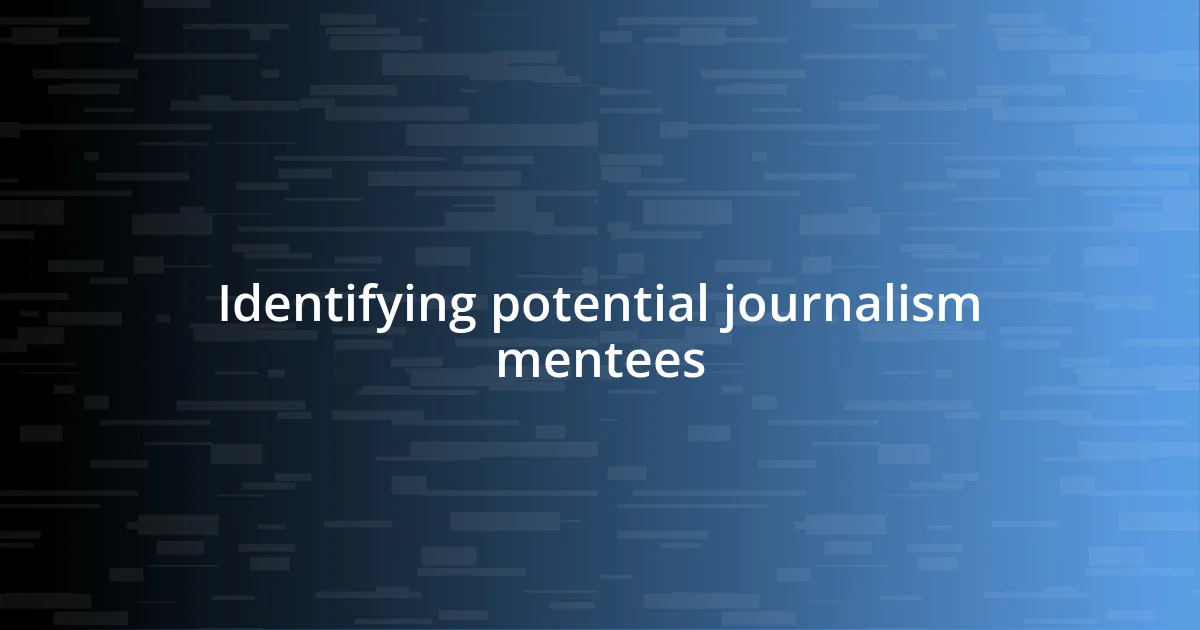
Identifying potential journalism mentees
When it comes to identifying potential journalism mentees, I’m always on the lookout for individuals who exhibit curiosity and passion for storytelling. I recall a budding journalist in my early career who would excitedly approach me after every class, asking probing questions about ethics and integrity in reporting. This relentless pursuit of knowledge not only showcased her dedication but also indicated a promising future in journalism. It’s not just about technical skills; a true mentee has an innate desire to learn and grow.
Here are a few key traits I look for when identifying potential mentees:
- Curiosity: They ask thoughtful questions and seek to know more about the world around them.
- Ethical mindset: They demonstrate a strong understanding of journalistic ethics, showing integrity in their work.
- Resilience: They bounce back from criticism, viewing it as an opportunity to improve and refine their craft.
- Adaptability: They embrace change, whether it’s a shift in media landscape or new storytelling techniques.
Identifying mentees isn’t just about spotting talent; it’s also about sensing their commitment to the craft. I believe that mentorship is invaluable for nurturing the next generation of ethical journalists who can navigate the complexities of our ever-evolving field.
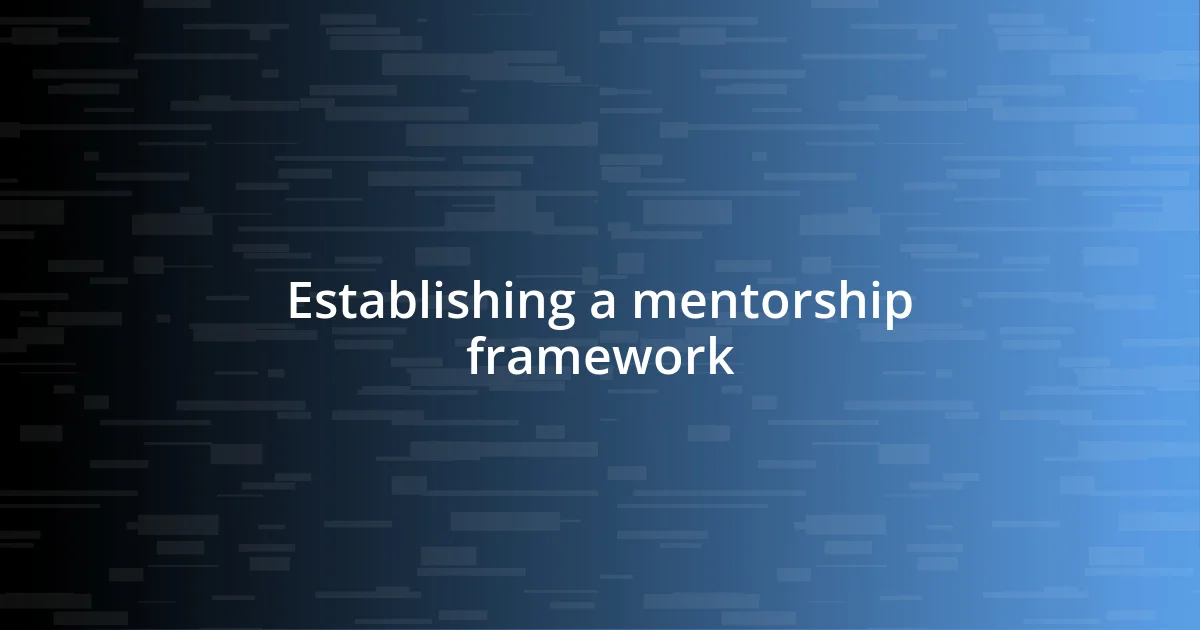
Establishing a mentorship framework
Establishing a mentorship framework is crucial to fostering an environment where ethical journalism can thrive. In my experience, a good framework should start with clear objectives, such as promoting values like integrity and accountability. I vividly remember when I was a mentor for an aspiring journalist who struggled with ethical dilemmas. Having a structured guide helped us navigate those conversations effectively, ensuring that he could learn from my experiences while developing his moral compass.
Creating a sustainable mentorship relationship involves regular check-ins and open lines of communication. I once had a mentee who felt overwhelmed by the rapid changes in the media landscape. By establishing a supportive framework, we were able to address her concerns directly and adapt our strategy, focusing on building her confidence and resilience. Regular feedback sessions are not just beneficial; they are essential in maintaining the momentum of a mentorship program.
Finally, involving the mentees in shaping the mentorship framework can lead to more dynamic and effective learning experiences. I recall encouraging a mentee to take the lead on projects we worked on together, allowing her to set the direction based on what she wanted to learn most. This not only instilled a sense of ownership in her journey but also opened up avenues for deeper discussions about ethical practices in journalism.
| Key Element | Description |
|---|---|
| Clear Objectives | Defining goals that nurture ethical journalism values, ensuring both mentor and mentee are aligned. |
| Open Communication | Facilitating ongoing dialogue to address challenges and celebrate successes during the mentorship journey. |
| Mentee Involvement | Empowering mentees to influence their learning path, fostering engagement and personal ownership. |
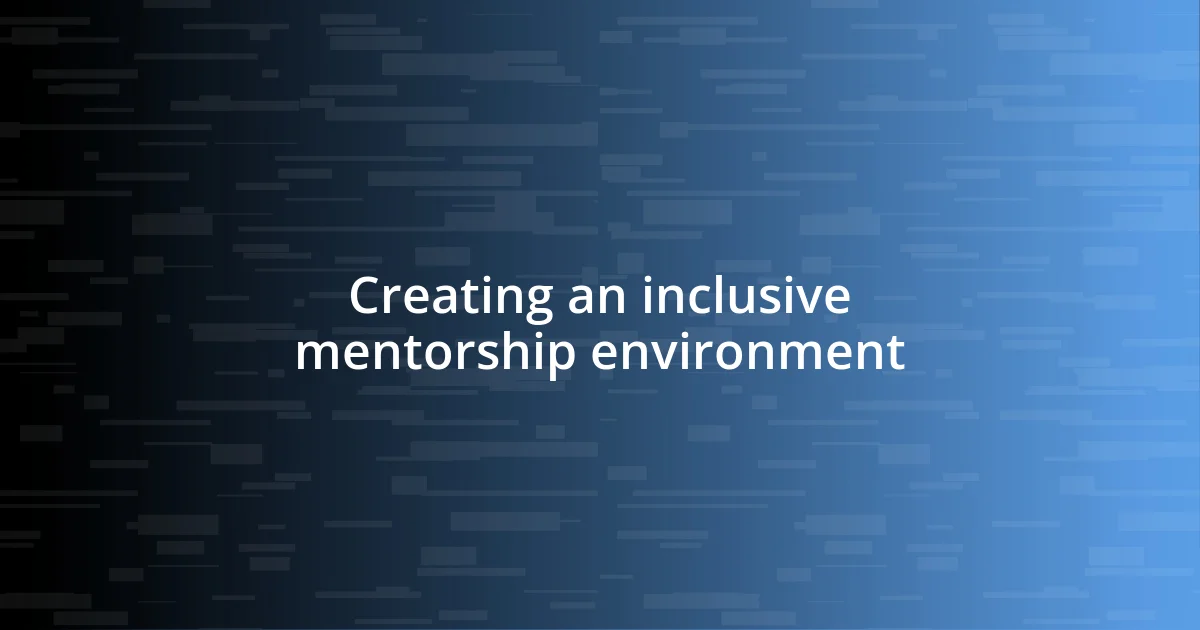
Creating an inclusive mentorship environment
Creating an inclusive mentorship environment requires intentionality and a genuine commitment to diversity. I remember a time when I mentored a group of students from different backgrounds. Each person brought unique perspectives to the table, enriching our discussions in unforeseen ways. This experience made me acutely aware of how a variety of voices can lead to deeper understanding and, ultimately, greater ethical considerations in journalism.
Inclusivity isn’t just about who is in the room; it’s about how everyone feels while they are there. I once held informal gatherings where mentees felt free to share their thoughts without fear of judgment. This open atmosphere inspired a candid discussion that led to powerful insights on ethical dilemmas they had encountered. I often wonder: how can we expect to shape ethical journalists if we don’t first create a space where they feel comfortable exploring complex ideas?
Moreover, I believe mentorship must actively seek to amplify underrepresented voices. For instance, I made it a point to invite guest speakers from marginalized communities to share their stories and experiences. Witnessing my mentees engage with those narratives was profoundly moving. It reinforced my conviction that a truly inclusive environment nurtures empathy and respect—two foundational elements for ethical journalism.
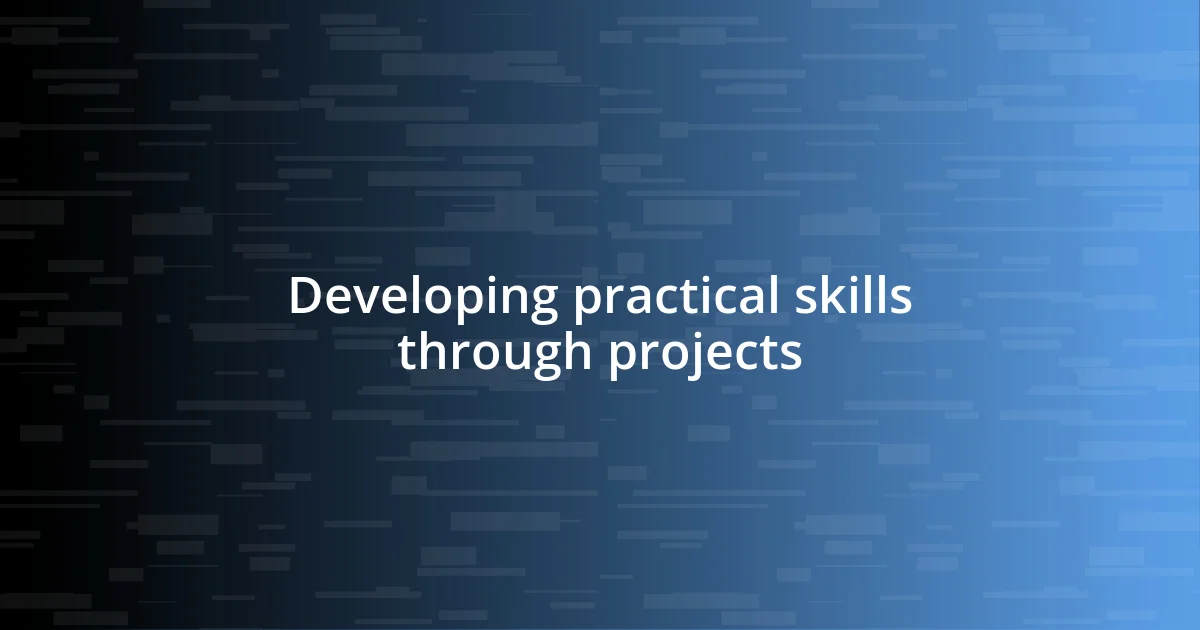
Developing practical skills through projects
Developing practical skills through projects is where the real learning happens. I remember working on a documentary project with a group of budding journalists who were initially uncertain about their roles. As we dived into research, interviews, and editing, I saw their confidence grow—each step became a tangible lesson in storytelling and ethical decision-making. It’s incredible how hands-on experience can transform theoretical knowledge into practical expertise.
I once facilitated a community outreach project that involved reporting on local issues. I partnered a mentee with a seasoned reporter, allowing her to learn on-the-go. She encountered real-world ethical dilemmas, like balancing the need for sensational headlines with the responsibility of fair reporting. Watching her navigate those challenges taught me just as much about mentorship as it taught her about journalism. Isn’t it fascinating how shared experiences can become powerful learning opportunities?
When I look back at my mentorship journey, I realize the importance of well-defined projects. For example, structuring a project with clear deliverables not only clarified expectations but also fostered accountability. My mentees often expressed how these projects pushed them to think critically and act decisively. They took ownership of the work, feeling proud of their contributions. I often ask myself: what better way is there to learn than by doing? Projects can provide that essential bridge between theory and practice, culminating in robust ethical journalism skills.
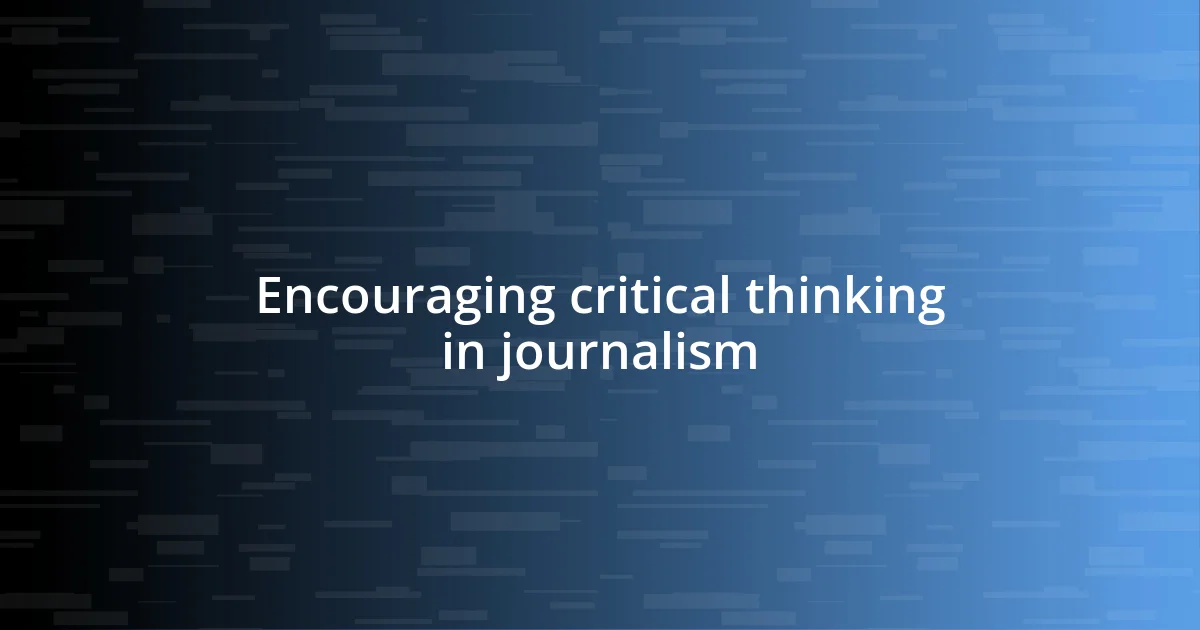
Encouraging critical thinking in journalism
Encouraging critical thinking in journalism is vital for developing a well-rounded, ethical perspective. I often share a story from my early days in journalism when I covered a controversial local issue. Instead of simply reporting on it, I gathered my peers to debate the implications of our coverage. It was eye-opening to witness how varied viewpoints shaped our understanding, pushing us to question our biases and assumptions. This experience reminded me that critical thinking is not just about asking questions but about engaging deeply with diverse perspectives.
I’ve also found that prompting my mentees with thought-provoking scenarios can spark rich discussions. Once, I posed a hypothetical situation involving a whistleblower and the ethical challenges of sourcing information. The conversations that followed were intense and enlightening, revealing how my mentees grappled with their values and responsibilities as journalists. By challenging them to think critically, I hoped to instill a sense of moral inquiry in their work. Isn’t it fascinating how a single question can provoke such profound reflection?
Moreover, I believe that fostering an environment where mistakes are viewed as learning opportunities fuels critical thinking. During a workshop, a mentee misrepresented a source in their article. Instead of criticism, we spent time dissecting the error together, discussing how it could radiate misinformation. I was struck by their vulnerability and eventual growth from that oversight. I often ask myself: if we shelter our mentees from their missteps, how will they learn to navigate the complex ethical landscape of journalism? This approach not only enhances critical thinking but also cultivates resilience, which is essential for any journalist.
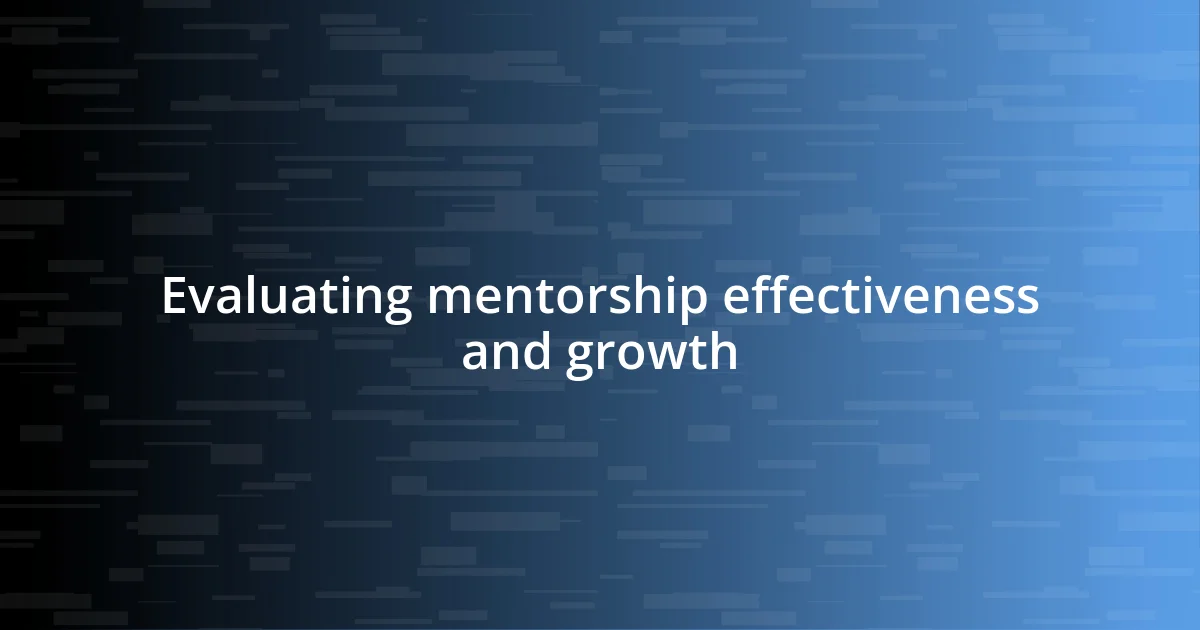
Evaluating mentorship effectiveness and growth
Evaluating mentorship effectiveness and growth involves reflecting on both outcomes and processes. I remember a time when a mentee approached me, feeling overwhelmed by her rapid progress. She asked, “Am I really ready to interview a prominent figure in our community?” I saw a chance to evaluate not just her skills but also her confidence. It made me realize that growth isn’t always about measurable accomplishments; sometimes, it’s about the emotional readiness to step out of one’s comfort zone.
I often utilize feedback sessions as a tool for evaluation. For instance, after a collaborative investigation, I encouraged my mentees to assess our project and their contributions openly. One mentee shared how she learned to balance different perspectives while managing tight deadlines. This specific insight illuminated her growth trajectory beyond just reporting skills; it showed her evolving understanding of teamwork and ethical journalism. Asking questions like, “What did you learn about your strengths and weaknesses?” can foster an environment of self-reflection and growth.
Another method I apply is monitoring individual progress over time. I recall one mentee who initially struggled with crafting compelling narratives. After various attempts, his perseverance began to pay off, and I witnessed a remarkable transformation. Celebrating those small victories, I often ask, “How far have you come since we started this journey?” Recognizing both challenges and achievements fuels motivation and encourages a culture of continuous improvement. It’s rewarding to see how this dynamic evolves, reinforcing my belief that effective mentorship must not just teach but inspire growth on multiple levels.




